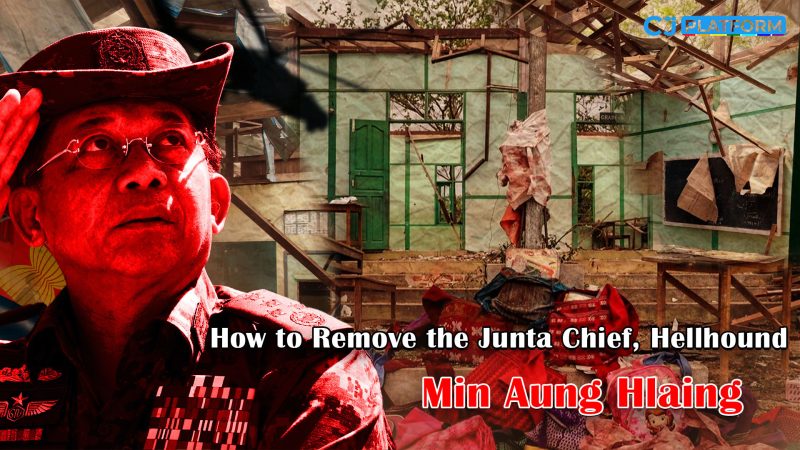How to Remove the Junta Chief, Hellhound Min Aung Hlaing

Just three days after Chinese Emperor Xi Jinping advised Myanmar’s junta chief, Min Aung Hlaing, in Moscow to handle his country’s politics with a broad vision, the junta demonstrated its murderous expertise by dropping a series of bombs on children at school.
Xi Jinping and Min Aung Hlaing met in Moscow on May 9. This was Xi Jinping’s first audience since the unsuccessful coup, apparently granting the junta official international legitimacy. Xi Jinping grasped the bloodstained hand of Min Aung Hlaing, seemingly oblivious to the revulsion it should inspire. Soon after, he witnessed Min Aung Hlaing’s masterfully honed killing skills.
However, China, a powerful autocracy, shamelessly courts every dictator on Earth, paving golden roads of self-interest. It is certain they will dismiss the school bombing as an internal Myanmar affair. Besides, the junta killing its own people is a daily occurrence, hardly something to raise eyebrows over.
Nevertheless, choosing to bomb a school directly while children were learning, with no nearby clashes, indicates a deliberate targeting for slaughter.
On the morning of May 12, in Oe Htein Kwin village school, Tabayin Township, the sweet sounds of children reciting lessons turned into screams of hell as death rained down from fighter jets, mercilessly killing them. Twenty children and two teachers died instantly. As of May 17, two more injured children had died, with around 100 others injured. It is likely many more children will live with permanent disabilities.
The junta, capable of killing but unwilling to admit it, denied bombing non-military targets. However, junta lobbyists claimed that bombs were being produced at the school and that it was being used as a base to attack junta troops in the town, thus justifying the bombing. Independent media reports, with their comprehensive information, clearly confirm the junta’s massacre.
The victims were children learning in school. The massacre occurred during a ceasefire. The junta had declared ceasefires for earthquake relief – from April 2nd to 22nd, April 23rd to 30th, and March 6 to 31 – yet continued aerial bombings, heavy artillery fire, and military offensives.
During the third ceasefire extension, from May 6 to 14, the junta’s air force conducted over 30 bombing raids across the country, including earthquake-affected areas, resulting in the deaths of nearly 90 people, according to the BBC.
Aerial attacks occurring almost daily after ceasefire declarations have become the junta’s tradition. While the international community largely ignored this, the mass killing in the Oe Htein Kwin village school bombing has, as usual, ignited outrage.
Anwar Ibrahim, the current ASEAN chair and Prime Minister of Malaysia, who met Min Aung Hlaing in Bangkok on April 17, shook his hand, and urged him to cease hostilities to effectively assist earthquake victims, is now shamefaced due to his wishful thinking regarding Min Aung Hlaing. However, ASEAN, as usual, was once again pretending not to see the hell that unfolded in Oe Htein Kwin village.
This pretense of ignorance regarding the junta’s killings is nothing new. It’s the ASEAN way, from the start of the unsuccessful coup in 2021 until today. ASEAN seems to consider itself highly responsible by including condemnations of violence in statements issued after ASEAN summits and foreign ministers’ meetings. ASEAN even considers its decision to bar Min Aung Hlaing and junta foreign minister Than Swe from attending ASEAN summits and foreign ministers’ meetings a bold move. This is because ASEAN’s approach avoids criticizing the junta and seeks to implement the Five-Point Consensus through appeasement. Therefore, the Oe Htein Kwin village school massacre will likely be ignored as if it doesn’t concern them.
The UN and Western countries, who do not confer legitimacy upon Min Aung Hlaing, have been left staring at the hellish scene of the Oe Htein Kwin village school. True to form, they issued strong statements of condemnation. The UN Secretary-General also vehemently condemned the atrocity from his ivory tower in New York. The US, France, Australia, and others not only protested strongly but some even called for dialogue with the child-eating ogre—as if asking it to observe a fast. The European Union’s statement called for punishing the perpetrators. However, as usual, there has been no visible follow-up on how to implement these punishments, making it seem like nothing more than emotional outbursts upon witnessing the grotesque deaths of children.
In reality, the international community’s repeated issuance of ineffective statements raises the question of whether they are merely trying to project an image of themselves as fully democratic and civilized governments.
Just like after the massacres in Pazigyi, Anantapar, and Let Yat Kone—where strong condemnations were issued for a week or ten days before fading into silence—it is almost certain that the Oe Htein Kwin village school bombing will be forgotten by the end of May. With nothing beyond such statements, the junta simply ignores them, and the people of Myanmar are too disheartened to say anything more.
Why do these ineffective statements keep being the end of the matter? The failure to unite the scattered international forces regarding Myanmar seems to be the key issue. The first step toward creating a unified international force for Myanmar should be to consolidate the strength of prominent individuals from various international sectors who understand and support Myanmar’s Spring Revolution with genuine goodwill.
To put it plainly, the NUG government’s solo diplomatic efforts have so far only resulted in lip-service support from the international community. Realizing this situation, they should now strive to establish a new version of international unity.
The failure to establish a strong international focal point for Myanmar is a crucial factor in the inability to handcuff the hellhound Min Aung Hlaing, who continues to act with impunity under Russian and Chinese backing.
The Spring Revolution desperately needs practical assistance from the international community.

